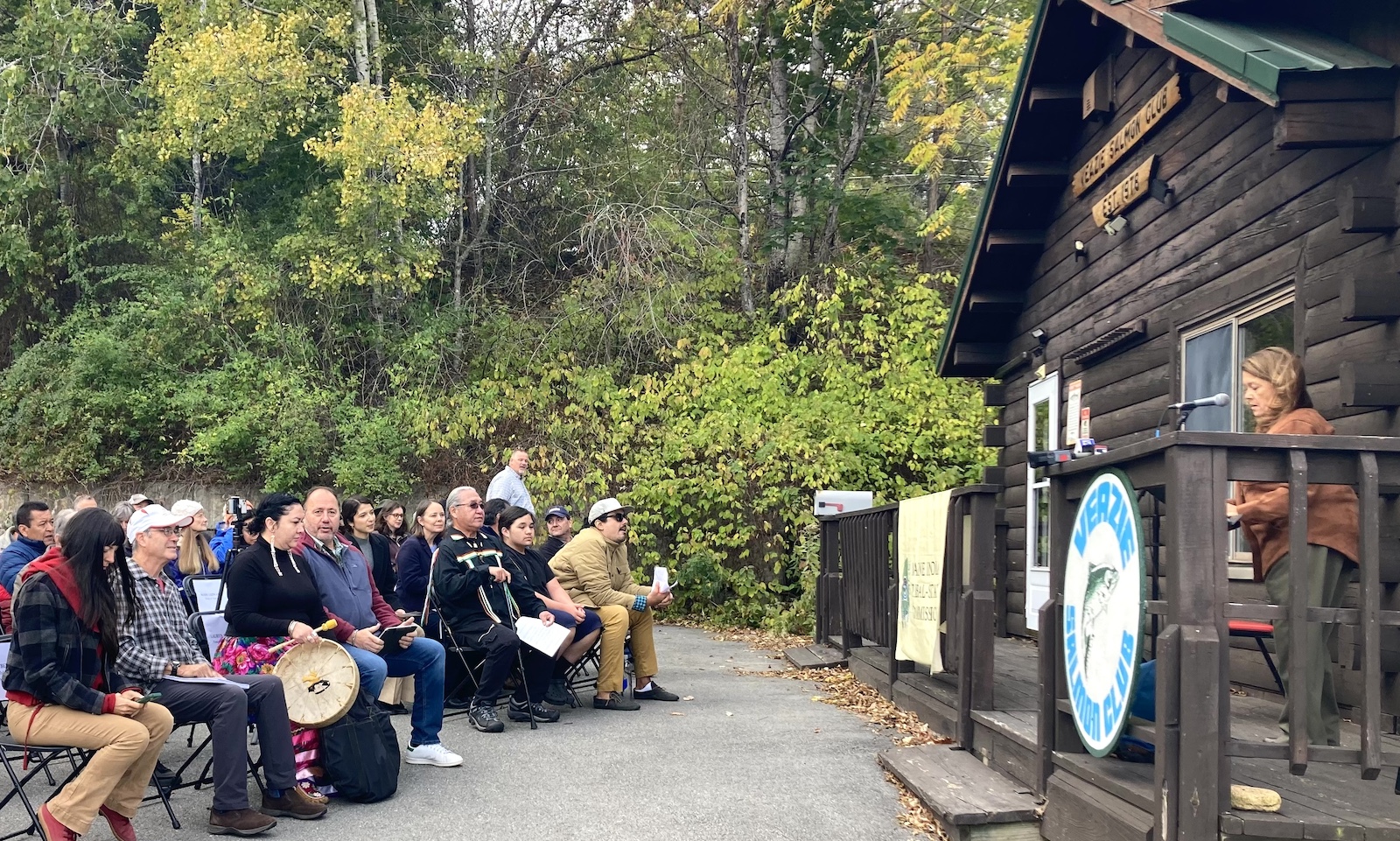
The Maine Indian Tribal-State Commission (MITSC) released an audiobook version of Sea Run, a report that examines the factors that have limited and continue to block tribal peoples’ access to sea-run fisheries and contributed to the severe decline in the fisheries themselves, and offers recommendations to bolster Wabanaki sustenance fishing and restore once abundant fish species. MITSC held the event at the Veazie Salmon Club, site of the now demolished Veazie Dam, formerly the initial obstacle on the Penobscot River to sea-run fish.
Read More >
MITSC is excited to invite you to the audiobook launch of Sea Run, authored by Dr. Anthony Sutton and Judd Esty-Kendall, Esq., at our event on Indigenous Peoples’ Day, October 13, 2025, from 10:00 a.m. to 11:00 a.m. at the Veazie Salmon Club
Read More >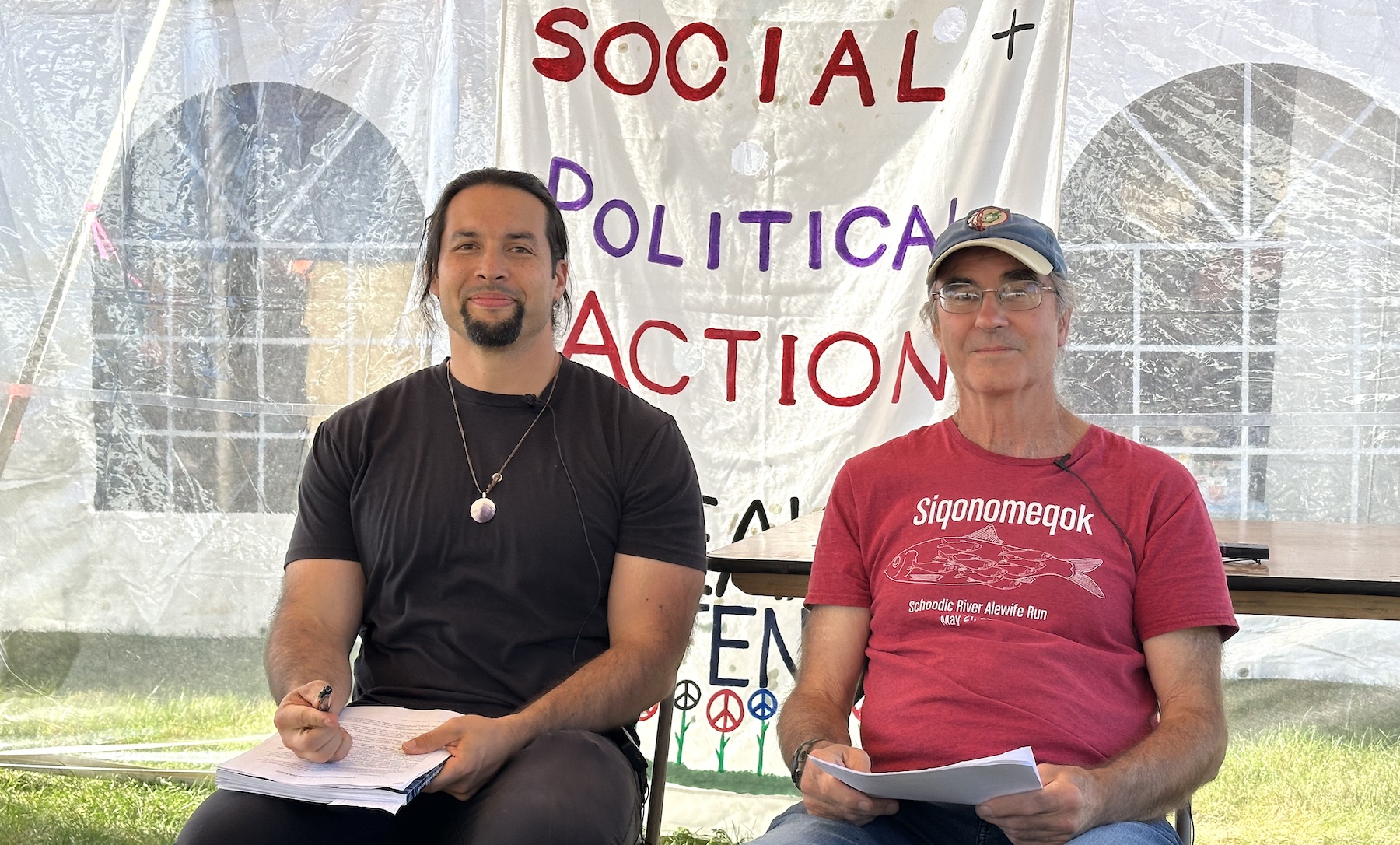
SEA RUN Co-authors Release Op-ed in Bangor Daily News
Read More >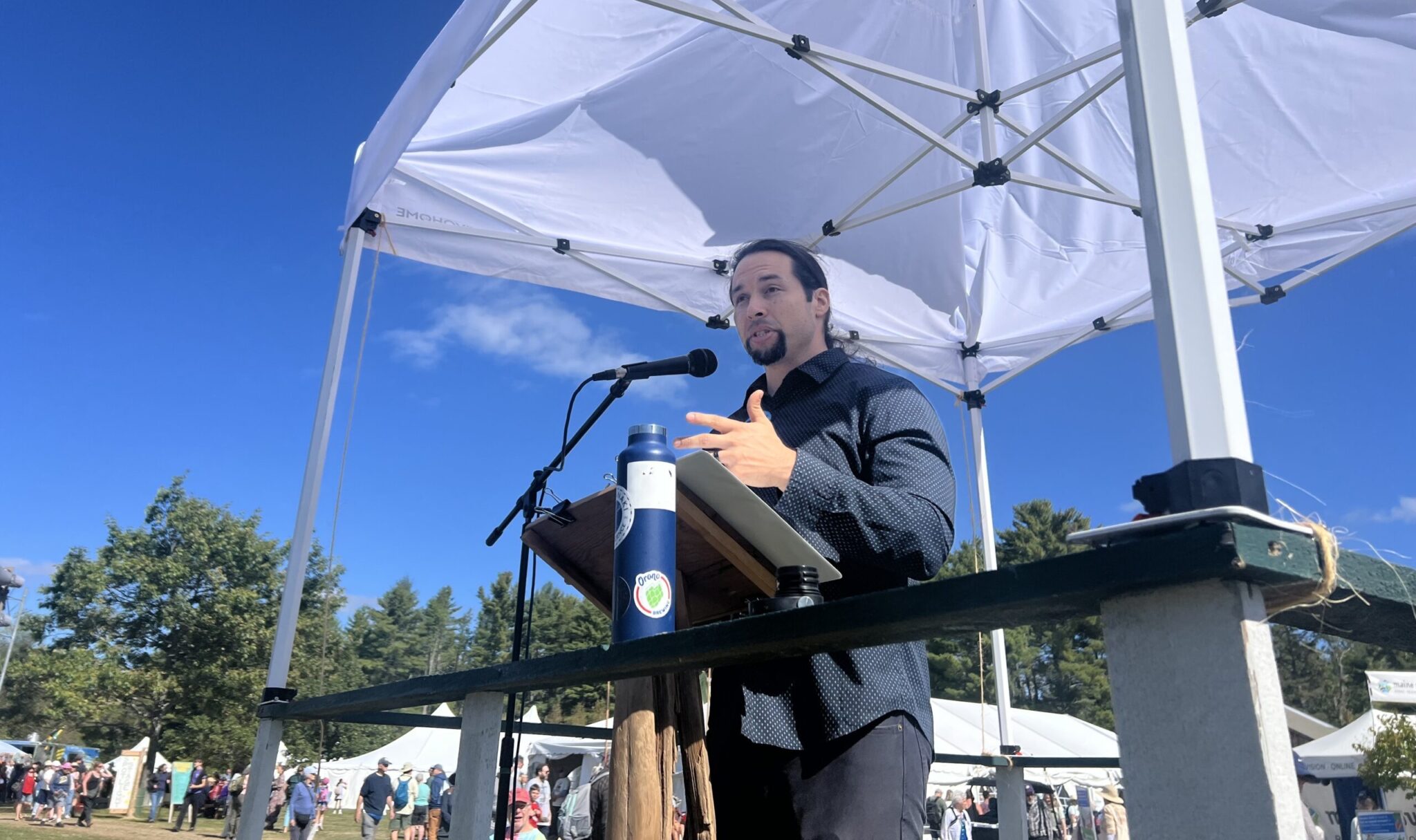
The Maine Morning Star's article on SEA RUN co-author Tony Sutton's keynote address at the Common Ground Country Fair.
Read More >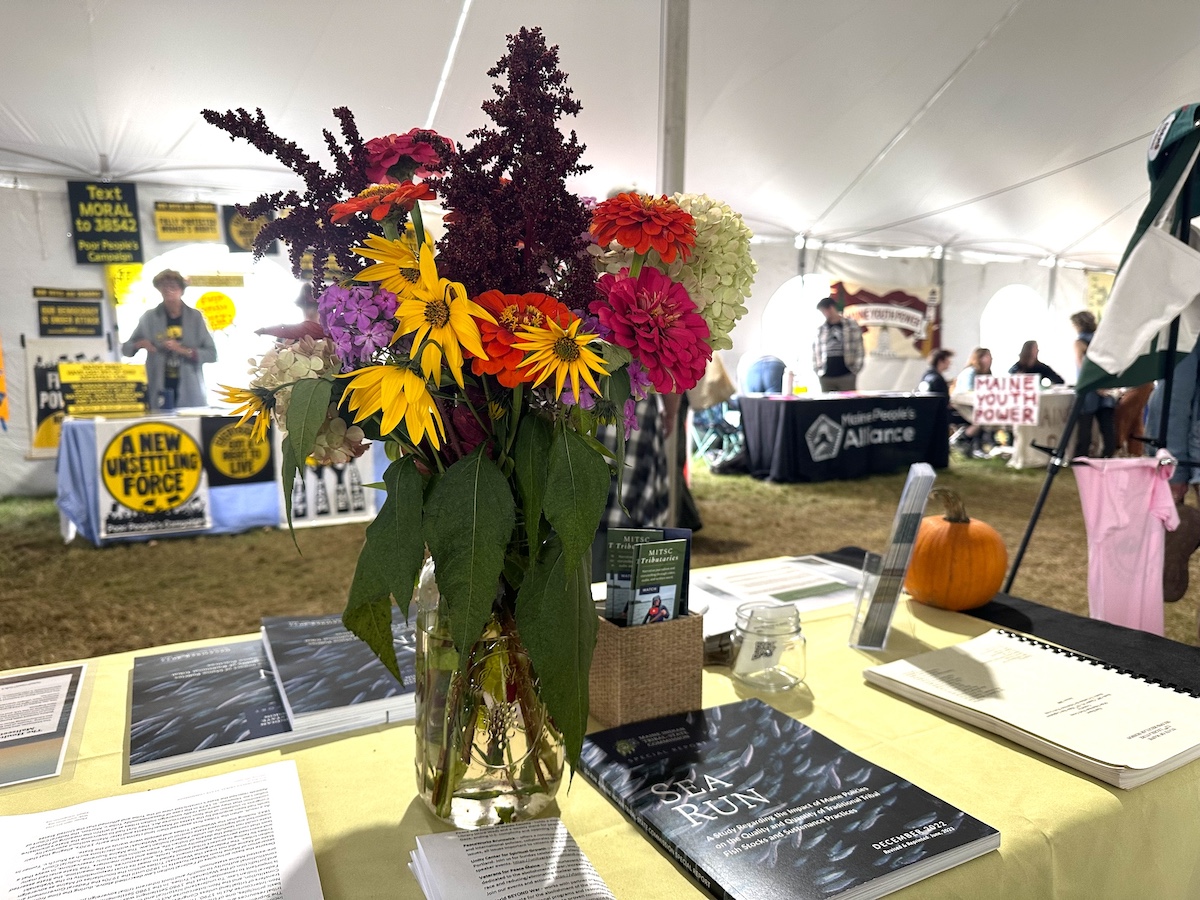
We're thrilled that co-authors of SEA RUN, Tony Sutton and Judd Esty-Kendall, will be giving a public talk covering many topics in the MITSC special report.
Read More >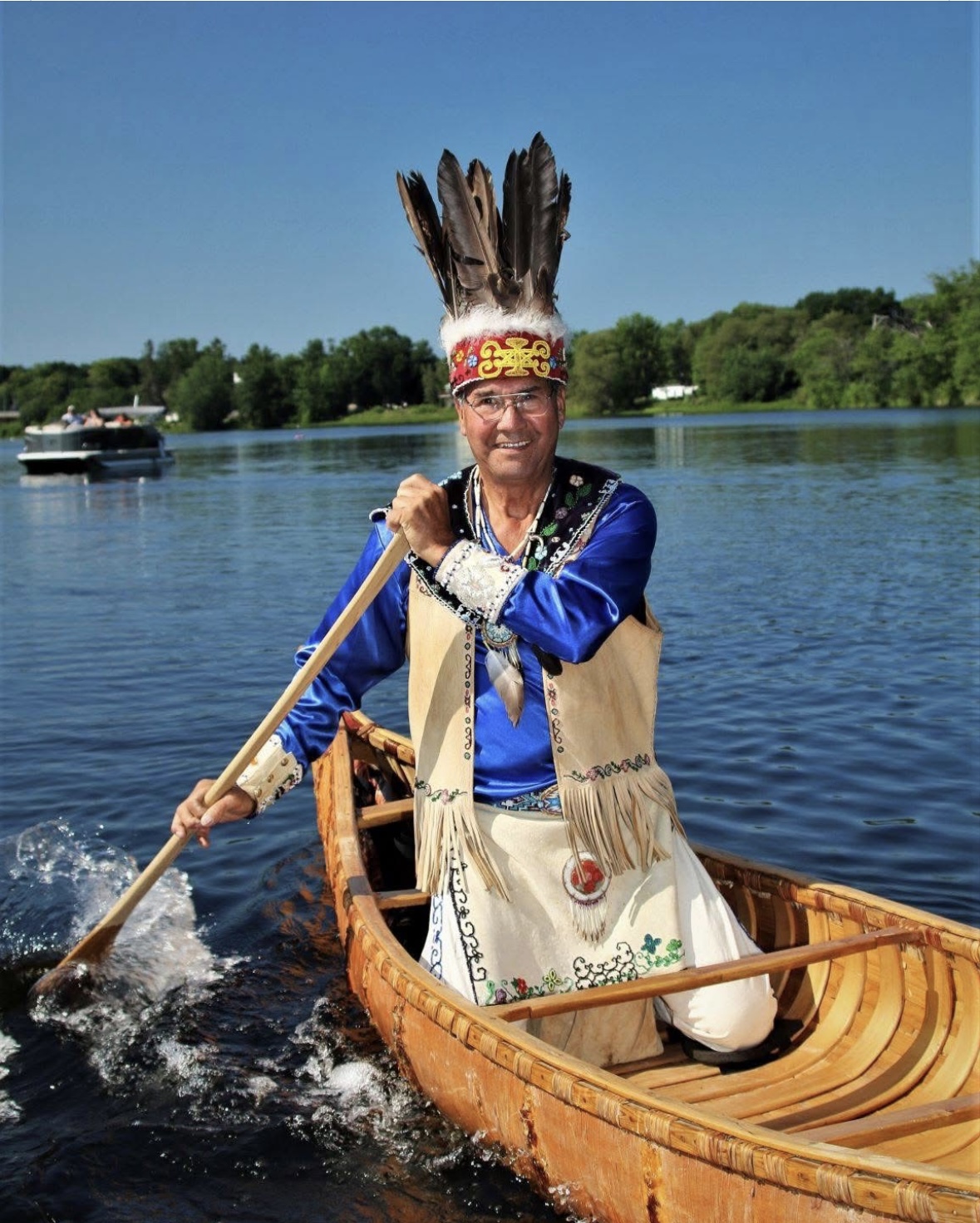
Reuben “Butch” Phillips, a Penobscot Nation elder, former government official, and spiritual leader died late Sunday night at a Bangor hospital surrounded by his family. They had said their farewells and were present for his passing into the realm of the ancestors, where he joined his beloved wife, Linda, and his sister Lorraine Dana. He was 85 — but even up to the end Phillips seemed at least 20 years younger. The Penobscot Nation community of Indian Island mourns his passing and is planning a tribal celebration of his life Saturday, August 2 at the Penobscot Nation.
Read More >
The Maine Indian Tribal State Commission (MITSC) and Wabanaki Public Health & Wellness (WPHW) are partnering to create a training for State of Maine government employees related to Wabanaki culture, history, and people.
Read More >
YWCA Central Maine has been a leader in working toward eliminating racism in Maine since 1878, and they continue this work today through education, providing opportunities that create equity in our community via their programming, advocacy, and outreach. Consider being part of the conversation. This conference comes at a time when we need to band together to gain knowledge, feel community, and have tangible action steps of how we can make a difference in our home lives, work lives, and face the day-to-day world we are living in.
Read More >
BANGOR, March 14, 2025 – The USDA’s Natural Resources Conservation Service (NRCS), the State of Maine Department of Inland Fisheries & Wildlife, the State of Maine Department of Marine Resources, and the Lead Partner the Passamaquoddy Tribe are holding a second public meeting to discuss the proposed watershed plan and environmental assessment for the “Bay of Fundy Aquatic Connectivity” project in Washington County, Maine. This meeting will be held on April 17, 2025, at the Cobscook Institute, 10 Commissary Point Rd., Township of Trescott, Maine, from 6:00 p.m. to 7:30 p.m.
Read More >.jpg)
America’s Field Trip is a nationwide student contest sponsored by America250, the official nonpartisan entity charged by Congress with planning the nation’s Semiquincentennial in 2026, also known as the 250th anniversary of the signing of the Declaration of Independence. America’s Field Trip invites students in grades 3–12 to be part of this historic milestone by sharing their perspectives on what America means to them — with the chance to earn a once-in-a-lifetime field trip experience at an iconic American landmark or cultural site, including the Smithsonian’s National Zoo, National Archives Museum, Kennedy Space Center, and Yellowstone National Park — just to name a few.Official Rules can be found at america250.org/FieldTrip/Rules.
Read More >
As we reflect on 2024, the Maine Indian Tribal-State Commission (MITSC) is proud to share the strides made in fostering improved tribal-state relations, protecting natural resources, and advancing the well-being of the Wabanaki Tribes.
Read More >
The Maine Indian Tribal-State Commission mourns the passing of President Jimmy Carter, who enacted the historic 1980 Maine Indian Claims Settlement Act. He entered the Presidency with the Passamaquoddy Tribe and the Penobscot Nation’s claims that the State of Maine violated federal law and legally took 12 million acres, almost two-thirds of Maine, in full dispute.
Read More >
Less than two years after it was launched, more than 1,000 learners have earned the University of Maine System Dawnland credential, which was developed by John Bear Mitchell, a citizen of the Penobscot Nation.
Read More >
The Wabanaki Alliance has hired Penobscot Nation Ambassador Maulian Bryant as the next executive director of the organization. She succeeds John Dieffenbacher-Krall, who will retire at the end of this year.
Read More >
This article from NOAA Fisheries highlights an international partnership led by the Passamaquoddy Tribe that will improve access to 600 miles and 60,000 acres of habitat to alewives and other sea-run fish. The work could result in the return of 80 million adult spawning alewives.
Read More >
The Wabanaki Alliance, a 501(c)(4) organization, is seeking an Executive Director.
Read More >MITSC is happy to announce that Rena Newell was appointed by Chief Pos Bassett as the Sipayik representative to the Maine Indian Tribal-State Commission on June 26, 2024.
Read More >
MITSC was recently awarded a $30,000 grant through the Sewall Foundation’s Wabanaki Communities and Tribal Governments focus area, part of the Healthy People Healthy Places program.
Read More >
This presentation introduces the new Center for Braiding Indigenous Knowledge and Science (CBIKS), an NSF-funded center aimed at creating ethical pathways to bring holistic thinking to bear on contemporary climate change issues. Dr. Bonnie Newsom, an associate professor of anthropology at the University of Maine, will present an overview of CBIKS goals, values, and objectives and highlight the university’s role as the Center’s Northeast Hub.
Read More >
The Senate passed LD 2001, following House passage last week. This bill would give teachers and schools the resources they need to teach Wabanaki and African American studies, just as Maine law demands.
Read More >
Maine's new sports betting platforms are off to a brisk start, with gamblers averaging more than $1 million in wagers a day during the initial rollout. Two mobile apps began offering sports betting in Maine on Nov. 3 as the state joined a nationwide trend toward legalized gambling on athletics. According to figures from Maine's Gambling Control Unit, total wagers through Nov. 15 were just shy of $14 million.
Read More >
MITSC's new Executive Director, Jill E. Tompkins, was interviewed by national news media outlet, ITC News.
Read More >
On November 7th, 2023, voters passed ballot Question #6 which will restore certain original sections of the Maine Constitution to printed copies, including Maine’s treaty obligations to Wabanaki Nations & Citizens.
Read More >
The Maine Indian Tribal-State Commission (MITSC) is pleased to announce that Jill E. Tompkins joined MITSC as the new Executive Director on October 23rd, 2023.
Read More >
All day long on September 22, 23, and 24, MITSC will be at a booth in the Social and Political Action tent.
Read More >
Do you favor amending the Constitution of Maine to require that all of the provisions of the Constitution be included in the official printed copies of the Constitution prepared by the Secretary of State? A “yes” vote on Question 6 would restore certain original sections of the Maine Constitution to printed copies. Although these sections have always been part of the Maine Constitution as originally adopted in 1820, an amendment in 1876 prevented those sections from being printed in copies of the Constitution. Part of the redacted material pertained to Maine’s treaty obligations to Wabanaki people.
Read More >
On Thursday March 16th, for the first time in 21 years, leaders of the Wabanaki Nation delivered a "State of the Tribes" address to both chambers of the Legislature. Notably, this was the first time ever that all four tribes – the Passamaquoddy Tribe, the Penobscot Nation, the Houlton Band of Maliseet Indians and the Mi’kmaq Nation addressed a joint session of the Legislature. Chief Clarissa Sabattis, of the Houlton Band of Maliseet Indians, spoke first and framed some of the issues that were also addressed by the other chiefs. She also requested support for proposals currently pending in the legislature involving Wabanaki Studies, ICWA Protections, and Tribal Sovereignty.
Read More >
In a March 9 briefing to the Maine Legislature, Harvard researcher Dr. Joseph Kalt, gave a talk to lawmakers summarizing a report he co-authored, on the "Economic and Social Impacts of Restrictions on the Applicability of Federal Indian Policies to the Wabanaki Nations in Maine." Dr. Kalt was invited to speak to the Legislature by House Speaker Rachel Talbot Ross, (D-Portland), Senate President Troy Jackson (D-Allagash) and House Minority Leader Billy Bob Faulkingham (R-Winter Harbor).
Read More >
A new study by Environmental Working Group scientists finds that consumption of just a single serving of freshwater fish per year could be equal to a month of drinking water laced with the forever chemical PFOS at high levels that may be harmful.
Read More >
According to a press release, dated December 5, 2022, from the Harvard Kennedy School, the Harvard Project on American Indian Economic Development released a research report documenting the costs to the Wabanaki Nations in Maine—Maliseet, Mi’kmaq, Passamaquoddy, and Penobscot—and to Maine’s non-tribal citizens of the non-application of federal Indian laws that promote Indian self-determination and self-governance.
Read More >
On November 9th, the US Supreme Court heard oral arguments in the case of Haaland v. Brackeen. This is one of the most important Indian Law cases in recent years. The constitutionality of the Indian Child Welfare Act (ICWA) is being challenged. The Court's decision is likely to have a major impact, not only on the ICWA but possibly on Federal Indian Law in general. The claim that the ICWA violates the Equal Protection Clause has the potential to substantially undermine much of Federal Indian Law. Maine's Attorney General joined in an amicus brief filed by numerous state AG's strongly supporting the importance and constitutionality of the federal Indian Child Welfare Act. That brief points out that striking down the ICWA based on an equal protection argument would also implicate many state statutes relating to Indians. The four Wabanaki Tribes joined an amicus brief prepared by the Native American Rights Fund. An audio recording can be accessed at: https://www.supremecourt.gov/oral_arguments/argument_audio/2022 A decision in the case is likely to be issued by spring of 2023.
Read More >
On October 28th, the Passamaquoddy Tribe of Sipayik held a Water Pump Grand Opening Ceremony in Perry across from the Sipayik Elementary School to celebrate the long-awaited use of the water pump there. Cyril Francis welcomed everyone to the circle. Elder, Gracie Paul, led an opening ceremony and song, and Ed Basset said a few words about the process of making this well available for the community and asked that everyone please take care of it and respect it. Chief Rena Newell cut the “ribbon” and filled the first jug of water from the new well, which the Tribe stressed will be open to all neighboring communities as well.
Read More >
Twenty-one years after the Maine Legislature passed a groundbreaking law requiring all schools to teach Maine K-12 students about Wabanaki territories, economic systems, cultural systems, governments and political systems, as well as the Wabanaki tribes’ relationships with local, state, national and international governments, four organizations are releasing a report analyzing the law’s implementation thus far and suggesting ways to improve compliance at the state and local level.
Read More >
MITSC had a booth in the Political Action Tent at this year's Common Ground Country Fair, which provided an excellent opportunity to share information and resources on history and current issues connected to Tribal-State relations.
Read More >
On June 21st the Passamaquoddy community held a Reclamation Celebration to commemorate the return of Kuwesuwi Monihq (Pine Island) to the tribe. Kuwesuwi Monihq is the largest island in Kci Monosakom or Big Lake, and holds great historic and cultural significance for the Passamaquoddy people.
Read More >
Click to access the report.
Read More >
Gov. Janet Mills signed into law on Monday a bill that adds Maine to the list of states that have legalized sports gambling and that gives Wabanaki tribes exclusive access to the booming online betting market. The bill, LD 585, was part of a trio of measures that were a high priority for tribal leaders during the 2022 legislative session. The new law gives the Passamaquoddy Tribe, the Penobscot Nation and the Houlton Band of Maliseet Indians exclusive rights to launch online or mobile platforms where Maine residents can place bets on athletic events. In-person betting will be allowed at Hollywood Casino in Bangor and Oxford Casino, as well as at off-track betting parlors around the state. But online platforms account for the vast majority of sports betting nationwide.
Read More >
On Thursday, April 21st, Gov. Janet Mills signed into law a bill that will give the Passamaquoddy Tribe more control over their drinking water supply.
Read More >
The United States Supreme Court has denied the Penobscot Nation and United States’ Petition to hear the Penobscot River Case.
Read More >
On December 3, 2021, the Penobscot Nation and US Solicitor General filed petitions for a writ of certiorari seeking review by the U.S. Supreme Court of the en banc decision by the First Circuit Court of Appeals in Penobscot Nation v. Frey. On December 21, 2021, the MITSC commissioners voted, unanimously, to file another amicus brief in support of the positions taken by the Penobscot Nation and the United States. The brief was successfully filed on January 6, 2022.
Read More >
The Maine Indian Tribal-State Commission is pleased to announce that it has officially appointed a new chairperson, Newell Lewey.
Read More >
Nearly 130 years ago, an anthropologist visited Calais and recorded songs, words and stories from members of the Passamaquoddy tribe. For years, these field recordings, some of the oldest in the world, were largely hidden from public view.
Read More >